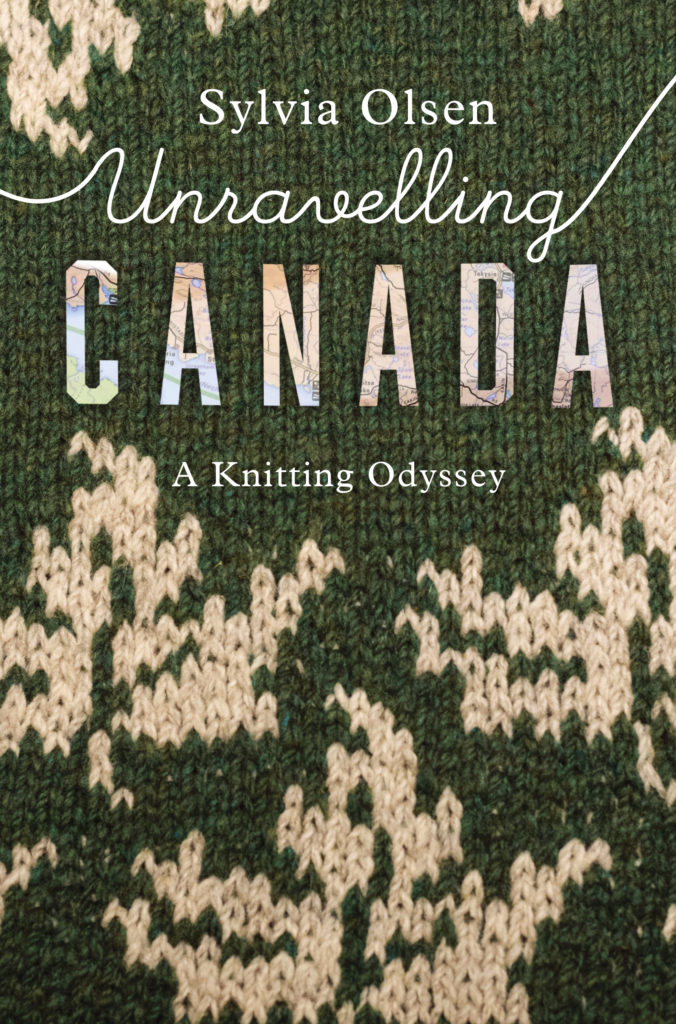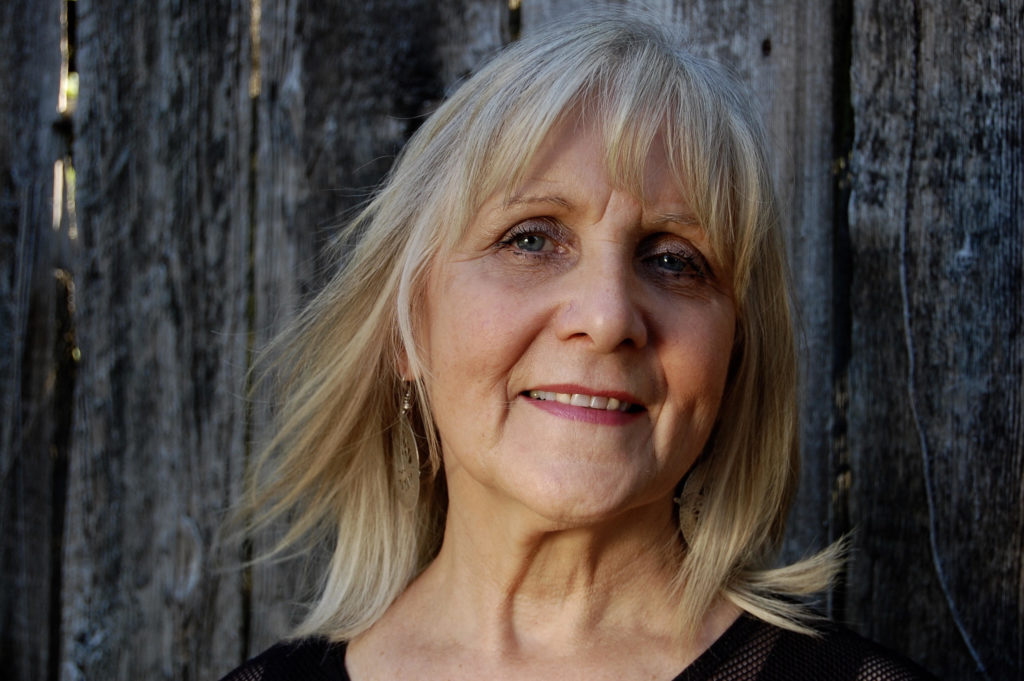By Gail Picco June 22, 2021

Unravelling Canada: A Knitting Odyssey, Sylvia Olsen, Douglas & McIntyre, April 17, 2021, 256 pp., $24.70
(June 22, 2021) Canadian poet Lorna Crozier said of Unravelling Canada by Sylvia Olsen that “This book knits us together, not only with strands of wool but with compassion, intelligence, caring and storytelling of the most appealing kind.”
All that is true. Unravelling Canada is a page turner of a travelogue. But Sylvia Olsen manages—through delivering knitting workshops to 40 communities from one end of the country to the other—to cover an incredible amount of historical and sociological ground as she pulls at the stitches of Canadian history.
Her perspective is unique. In 1972 she married a Coast Salish man and moved onto a First Nation shortly after that, where she lived for 30 years. And she has also authored 20 books for adults and children. Everyday looking out the window, she says, was a lesson in how her early views of Canada had been misguided.
“When I travelled in Britain, I was proud to think of Canada as the best country in the world. After moving to a First Nation community, I was gripped with grief, guilt, and confusion. By just crossing the road I encountered a level of poverty I had never imagined existed in Canada. This experience formed my worldview and framed my life. I have never, and doubt I will ever, stop asking the question “How could such disparate living conditions exist within one country?”
Olsen’s trip starts with the iconic Cowichan sweaters, a uniquely patterned sweater made by many Coast Salish knitters to sell in the mid-to late-20th century. Back in the day, to have a Cowichan sweater was cool, and the companies like Mary Maxim and White Buffalo sold replicas of the hand knit sweaters.
But there’s more than knitting in Unravelling Canada. Themes explored include cultural appropriation, myths about Indigenous history but also lots of talk of “boyfriend” sweaters, and modern-day knitters finding a sense of community by drinking latte in yarn shops where a ball of wool costs $15 or $20 dollars. Knitting is an expensive hobby now, but it wasn’t always so.
Olsen’s mother-in-law taught Olsen about knitting.
“My personal search for what it means to be genuine goes back to when I first got to know my mother-in-law, Laura Olsen. She was a Coast Salish woman who lived until she was ninety-three. Laura learned to knit as a little girl, during school breaks, but she had been knitting pretty much full-time since she got out of residential school at the age of fifteen. During the seventy-eight years that followed, she said she knit on average more than ten sweaters a year. That means she knit somewhere around a thousand sweaters in her lifetime. She couldn’t have counted how many hats, slippers and mittens she had knit. Right from the start, Laura and I made wool together, and she encouraged me to knit. She told me to copy the sweaters I liked. She said that’s how the Coast Salish learned to knit in the first place.”
They are part of a family of bulky wool sweaters like Icelandic, Aran and Fair Isle sweaters made by knitters across the country. Olsen visits the people who are making the sweaters, dropping in on the communities and small businesses built around knitting. Canada’s oldest mill still in operation is Briggs & Little in York Mills, New Brunswick, at the same location since 1857, and run by the son of the owner, the younger generation having taken up the mission of producing 100 per cent pure wool yarns.
When Olsen arrives at her last stop—Newfoundland—she visits the iconic NONIA knitting shop. The NONIA (Newfoundland Outport Nursing and Industrial Association) was established as a nonprofit in 1924, when Newfoundland was still a British colony, to pay for the public health nurses Newfoundland women needed to help birth their babies and keep their children healthy. NONIA knitters made caps, sweaters, mittens, and other garments to pay for nurses’ salaries. When Britain decided to pay the salaries of public health nurses, the knitters continued knitting to supplement their family income. And they continue today, many of them very elderly women knitting pretty much the same patterns as they did in the 1950s for little more than a token payment for the effort.

Photo by Tex McLeod
But knitting has moved on from the 1950s and the work of these knitters doesn’t resonate in today’s market.
“As we left the [NONIA] workshop, my heart sank. I had lived this story before. Although NONIA began in a different way than the Coast Salish knitting industry, both became economic schemes for women who otherwise had little or no income. The federal government did not fund either craft movement, but it supported them by way of advertising and promotions. Coast Salish and NONIA knitters produced beloved products that became icons of their respective provinces, but both groups struggled to survive. Knitting is not a contemporary way to make a living, and when the economy of handworkers meets the modern world, the modern world wins.”
Olsen says one of her goals of her cross-country knitting tour was to share her experience of living and working with Coast Salish knitters, seeing their experience as the perfect archetype of colonization in Canada, and ultimately, she saw the country as book-ended by rich knitting traditions. And a whole lot in between.
See Talking UP Podcast with Sylvia Olsen
Other reviews by Gail Picco
A Girl Called Echo: A Resounding Messenger of Métis History May 10, 2021
David Love: Thoughts of an Environmental Fundraiser April 30, 2021
What Bears Teach Us: The push and pull of co-existence December 8, 2020
Begin Again by Eddie Glaude: James Baldwin as a Man for our Time November 30, 2020
She Proclaims: The necessity of women persistently proclaiming October 20, 2020
The reputation of philanthropy: A history of the facts September 18, 2020
Juneteenth: ‘The most keenly awaited novel of the 20th century’ June 19, 2020